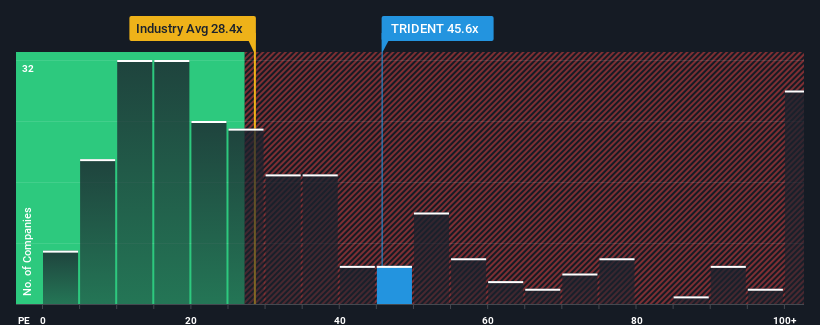There's Reason For Concern Over Trident Limited's (NSE:TRIDENT) Price
Trident Limited's (NSE:TRIDENT) price-to-earnings (or "P/E") ratio of 45.6x might make it look like a sell right now compared to the market in India, where around half of the companies have P/E ratios below 30x and even P/E's below 17x are quite common. Nonetheless, we'd need to dig a little deeper to determine if there is a rational basis for the elevated P/E.
Trident could be doing better as its earnings have been going backwards lately while most other companies have been seeing positive earnings growth. One possibility is that the P/E is high because investors think this poor earnings performance will turn the corner. You'd really hope so, otherwise you're paying a pretty hefty price for no particular reason.
See our latest analysis for Trident

Is There Enough Growth For Trident?
In order to justify its P/E ratio, Trident would need to produce impressive growth in excess of the market.
Retrospectively, the last year delivered a frustrating 14% decrease to the company's bottom line. However, a few very strong years before that means that it was still able to grow EPS by an impressive 56% in total over the last three years. Although it's been a bumpy ride, it's still fair to say the earnings growth recently has been more than adequate for the company.
Shifting to the future, estimates from the sole analyst covering the company suggest earnings should grow by 13% over the next year. With the market predicted to deliver 24% growth , the company is positioned for a weaker earnings result.
With this information, we find it concerning that Trident is trading at a P/E higher than the market. Apparently many investors in the company are way more bullish than analysts indicate and aren't willing to let go of their stock at any price. There's a good chance these shareholders are setting themselves up for future disappointment if the P/E falls to levels more in line with the growth outlook.
What We Can Learn From Trident's P/E?
We'd say the price-to-earnings ratio's power isn't primarily as a valuation instrument but rather to gauge current investor sentiment and future expectations.
Our examination of Trident's analyst forecasts revealed that its inferior earnings outlook isn't impacting its high P/E anywhere near as much as we would have predicted. When we see a weak earnings outlook with slower than market growth, we suspect the share price is at risk of declining, sending the high P/E lower. Unless these conditions improve markedly, it's very challenging to accept these prices as being reasonable.
And what about other risks? Every company has them, and we've spotted 1 warning sign for Trident you should know about.
If you're unsure about the strength of Trident's business, why not explore our interactive list of stocks with solid business fundamentals for some other companies you may have missed.
Valuation is complex, but we're here to simplify it.
Discover if Trident might be undervalued or overvalued with our detailed analysis, featuring fair value estimates, potential risks, dividends, insider trades, and its financial condition.
Access Free AnalysisHave feedback on this article? Concerned about the content? Get in touch with us directly. Alternatively, email editorial-team (at) simplywallst.com.
This article by Simply Wall St is general in nature. We provide commentary based on historical data and analyst forecasts only using an unbiased methodology and our articles are not intended to be financial advice. It does not constitute a recommendation to buy or sell any stock, and does not take account of your objectives, or your financial situation. We aim to bring you long-term focused analysis driven by fundamental data. Note that our analysis may not factor in the latest price-sensitive company announcements or qualitative material. Simply Wall St has no position in any stocks mentioned.
About NSEI:TRIDENT
Trident
Manufactures, trades, and sells textiles, paper, chemicals, and energy in India, the United States, and internationally.
Flawless balance sheet 6 star dividend payer.
Similar Companies
Market Insights
Community Narratives



